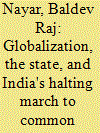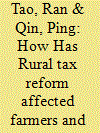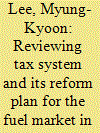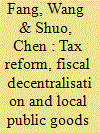|
|
|
Sort Order |
|
|
|
Items / Page
|
|
|
|
|
|
|
| Srl | Item |
| 1 |
ID:
081895


|
|
|
|
|
| Publication |
2008.
|
| Summary/Abstract |
Using simple statistical analysis of county-level budgetary data from across all of China's counties, the present paper examines whether the post-1994 fiscal decentralization has affected redistribution at the county-level. The new fiscal system has been less able to narrow inter-county dispersion in fiscal imbalances than the old one, even after taking intergovernmental transfer payments into account. Although with the post-1994 system there has been a modest increase in per capita welfare spending in all counties on average, much of the new-found fiscal resources have been spent on salary and administrative expenses rather than spending on public goods. Therefore, it is imperative that the reform of China's tax system is intensified
|
|
|
|
|
|
|
|
|
|
|
|
|
|
|
|
| 2 |
ID:
096124


|
|
|
|
|
| Publication |
2010.
|
| Summary/Abstract |
There is a considerable body of literature that has studied whether or not an adequately designed tax swap, whereby an ecotax is levied and some other tax is reduced while keeping government income constant, may achieve a so-called double dividend, that is, an increase in environmental quality and an increase in overall efficiency. Arguments in favor and against are abundant. Our position is that the issue should be empirically studied starting from an actual, non-optimal tax system structure and by way of checking the responsiveness of equilibria to revenue neutral tax regimes under alternate scenarios regarding technological substitution. With the use of a CGE model, we find that the most critical elasticity for achieving a double dividend is the substitution elasticity between labor and capital whereas the elasticity that would generate the highest reduction in carbon dioxide emissions is the substitution elasticity among energy goods.
|
|
|
|
|
|
|
|
|
|
|
|
|
|
|
|
| 3 |
ID:
170091


|
|
|
|
|
| Summary/Abstract |
In this paper, we use China’s value-added tax (VAT) reform in 2007, which was aimed to encourage fixed investment purchasing, as a natural experiment to explore the effect on firm financial leverage. Results show an expansion in firm balance sheet after the reform, manifested by greater liabilities (long-term, short-term and total liability) and asset. Moreover, in terms of the ratio to asset, it’s found that long-term liability rose while the short-term liability dropped, and as a net effect, the total asset-liability ratio declined as the latter effect dominated. To theoretically explain the observed patterns, three mechanisms are highlighted, “income effect”, “maturity-match effect” and “market disciplining effect”, where income effect corresponds to a proportional expansion of balance sheet while the latter two effects alter the composition of firm leverage.
|
|
|
|
|
|
|
|
|
|
|
|
|
|
|
|
| 4 |
ID:
145964


|
|
|
|
|
| Summary/Abstract |
South Sudan is in a unique combination of (post)-conflict reconstruction and the birth of a new state in which old policies are re-activated and new policies introduced. By looking at three case-studies of taxation and private sector regulation reforms, the paper will show how the overlapping and often contradictory regulatory frameworks of the state provide the setting for bricolage strategies by different actors. These actors, and particularly state officials, rely on a variety of institutional resources to implement, resist or remake certain regulatory measures. Although the breadth of regulatory measures has increased exponentially, the institutional corridor – the space in which bricolage is performed and on which various actors can rely – remains narrow. This space is contingent on wartime authority structures, and more particularly pre-existing Sudan's People Liberation Army/Movement (SPLA/M) power structures, as well as a deep-rooted resistance to centralised control. Importantly, these regulatory practices are not fixed: intense periods of rearrangement of the social order or ‘open moments’ may provide a window of opportunity for regulatory reform.
|
|
|
|
|
|
|
|
|
|
|
|
|
|
|
|
| 5 |
ID:
106451


|
|
|
|
|
| Publication |
2011.
|
| Summary/Abstract |
As a social phenomenon, globalization has been the target of much criticism. One particular line of attack holds that it will lead to the segmentation and disintegration of the national economy. However, an examination of the long process of reform of the indirect tax system in India underlines, paradoxically, the significant role of globalization precisely in fostering domestic economic integration in the form of a common market, which would overcome the economic segmentation existing prior to globalization. Interestingly, such tax reform has, in considerable part, been driven by the need to meet globalization's challenge that India's economy be efficient and internationally competitive. At the same time, one should not underestimate the critically important role of the state as an institutional variable-which critics tend often to ignore-in carrying through the goal of establishing a common market, presently a work still in progress.
|
|
|
|
|
|
|
|
|
|
|
|
|
|
|
|
| 6 |
ID:
076905


|
|
|
|
|
| Publication |
2007.
|
| Summary/Abstract |
Using nationally representative data, the present paper examines the impact of China's ongoing rural tax reform on farmers. The difficulties in further local governance restructuring are also discussed. It is argued that the issues associated with rural taxation and local governance in China result from inherent tension between an increasingly liberalized economic system and a still centralized political system. Although rural tax reform has helped to reduce farmers' tax burdens in the short term, the establishment of an effective local governance regime requires coordinated reforms to downsize local bureaucracy by providing social security for laid-off cadres, to strengthen local accountability by granting higher local formal tax autonomy, and to promote meaningful participation by expanding local democracy.
|
|
|
|
|
|
|
|
|
|
|
|
|
|
|
|
| 7 |
ID:
159699


|
|
|
|
|
| Publication |
New Delhi, Wisdom Tree, 2017.
|
| Description |
xi, 211p.hbk
|
| Standard Number |
9788183284981
|
|
|
|
|
|
|
|
|
|
|
|
Copies: C:1/I:0,R:0,Q:0
Circulation
| Accession# | Call# | Current Location | Status | Policy | Location |
| 059412 | 320.954/DEB 059412 | Main | On Shelf | General | |
|
|
|
|
| 8 |
ID:
187088


|
|
|
|
|
| Publication |
New Delhi, Wisdom Tree, 2017.
|
| Description |
xi, 211p.pbk
|
| Standard Number |
9788183285230
|
|
|
|
|
|
|
|
|
|
|
|
Copies: C:1/I:0,R:0,Q:0
Circulation
| Accession# | Call# | Current Location | Status | Policy | Location |
| 060224 | 320.954/DEB 060224 | Main | On Shelf | General | |
|
|
|
|
| 9 |
ID:
092515


|
|
|
| 10 |
ID:
059114


|
|
|
| 11 |
ID:
119181


|
|
|
|
|
| Publication |
2012.
|
| Summary/Abstract |
In contrast to its decentralized political economy model of the 1980s, China took a surprising turn towards recentralization in the mid-1990s. Its fiscal centralization, starting with the 1994 tax reforms, is well known, but political recentralization also has been under way to control cadres directly at township and village levels. Little-noticed measures designed to tighten administrative and fiscal regulation began to be implemented during approximately the same period in the mid-1990s. Over time these measures have succeeded in hollowing out the power of village and township cadres. The increasing reach of the central state is the direct result of explicit state policies that have taken power over economic resources that were once under the control of village and township cadres. This article examines the broad shift towards recentralization by examining the fiscal and political consequences of these policies at the village and township levels. Evidence for this shift comes from new survey data on village-level investments, administrative regulation and fiscal oversight, as well as township-level fiscal revenues, expenditures, transfers (between counties and townships) and public-goods investments.
|
|
|
|
|
|
|
|
|
|
|
|
|
|
|
|
| 12 |
ID:
172068


|
|
|
|
|
| Summary/Abstract |
Changing state–society relations in China have made it a challenge for the government to adopt unpopular policies that may incur blame and mass resistance. How can the Chinese regime adopt and implement unpopular policies when enforcement based on coercion is costly and undesirable? The article investigates property tax reform as a case to show how policy unpopularity and government strategies together resulted in a policy that failed to achieve any major policy goals. This study confirms China’s governance transformation compromises efficiency with broader public values and shows the limitedness of incremental reforms.
|
|
|
|
|
|
|
|
|
|
|
|
|
|
|
|
| 13 |
ID:
123361


|
|
|
|
|
| Publication |
2013.
|
| Summary/Abstract |
Based on my fieldwork in rural China in 2004-2005, where I conducted semi-structured interviews with 108 local cadres and villagers, this article explores the survival strategies of township governments as the most recent tax reforms (i.e. the tax-for-fee reform and the abolition of the agricultural tax) have been implemented since 2000. It argues that township governments have taken adaptive strategies to maintain over-quota personnel even under pressure to reduce it. It finds that the strategies have changed from predatory taxation in the 1990s to land trade in the last decade, while the implementation of the rural tax reforms has brought fiscal crises in agricultural villages. Local officials have a limited incentive to respond to collective resistance on taxation but do not have the same incentive on land disputes.
|
|
|
|
|
|
|
|
|
|
|
|
|
|
|
|
| 14 |
ID:
123734


|
|
|
|
|
| Publication |
2013.
|
| Summary/Abstract |
coordinated development of central and provincial economy and oil enterprises in oil producing provinces, this paper addresses the principal questions that determine the coordinated development of the central economy, provincial economy and oil enterprises, and establishes a dynamic model for the above three variables. The research takes Shaanxi Province as an example and makes analogue simulation of the situations from 2006 to 2020. The results indicate that China's provincial governments need to share more tax income, reform some taxes on oil enterprises, and China's oil industry needs to be open to both provincial state-owned enterprise Based on the characteristics of oil exploration and development and the inherent rule of a and private enterprise. Meanwhile, this research also provides policy proposals for the coordinated development of central and provincial economy and oil enterprises regarding taxation and sustainable development in China's market-oriented economy.
|
|
|
|
|
|
|
|
|
|
|
|
|
|
|
|
| 15 |
ID:
155937


|
|
|
|
|
| Summary/Abstract |
Using a provincial panel data set taking advantage of the time variations brought about by the 1994 fiscal reform, this study provides empirical evidence to the hypothesis that the level of public service improves when local governments enjoy a certain degree of fiscal autonomy. China is the ideal region for this identification strategy since it has experienced various changes in the central–local fiscal relationships during its economic transition. Besides the ordinary least squares estimation, the instrumental variables approach is also applied to address the problems of measurement error in fiscal decentralisation indexes. This research lends empirical support to the literature, which argues that decentralisation improves the delivery of public services.
|
|
|
|
|
|
|
|
|
|
|
|
|
|
|
|
| 16 |
ID:
182786


|
|
|
|
|
| Summary/Abstract |
The tax incentives designed to stimulate firm investment may have a large and unexpected impact on labor market outcomes. Using a comprehensive data set on Chinese manufacturing firms during the period 1998–2007 with a difference-in-differences approach, we examine the impact of the value-added tax reform in 2004 on the firm-level labor market outcomes. We find that firms in eligible industries and pilot regions (treated firms) enjoying lower costs of purchasing fixed assets under the reform tended to increase capital investment and reduce employment simultaneously relative to firms that did not have tax incentives (the control firms). Compared with the control firms, the treated firms became more capital intensive but had declines in labor share in value added and average wage. We also find that the employment adjustment is associated with increase in the share of skilled workers in terms of engineers and technicians, but not workers with a college degree or higher.
|
|
|
|
|
|
|
|
|
|
|
|
|
|
|
|
|
|
|
|
|